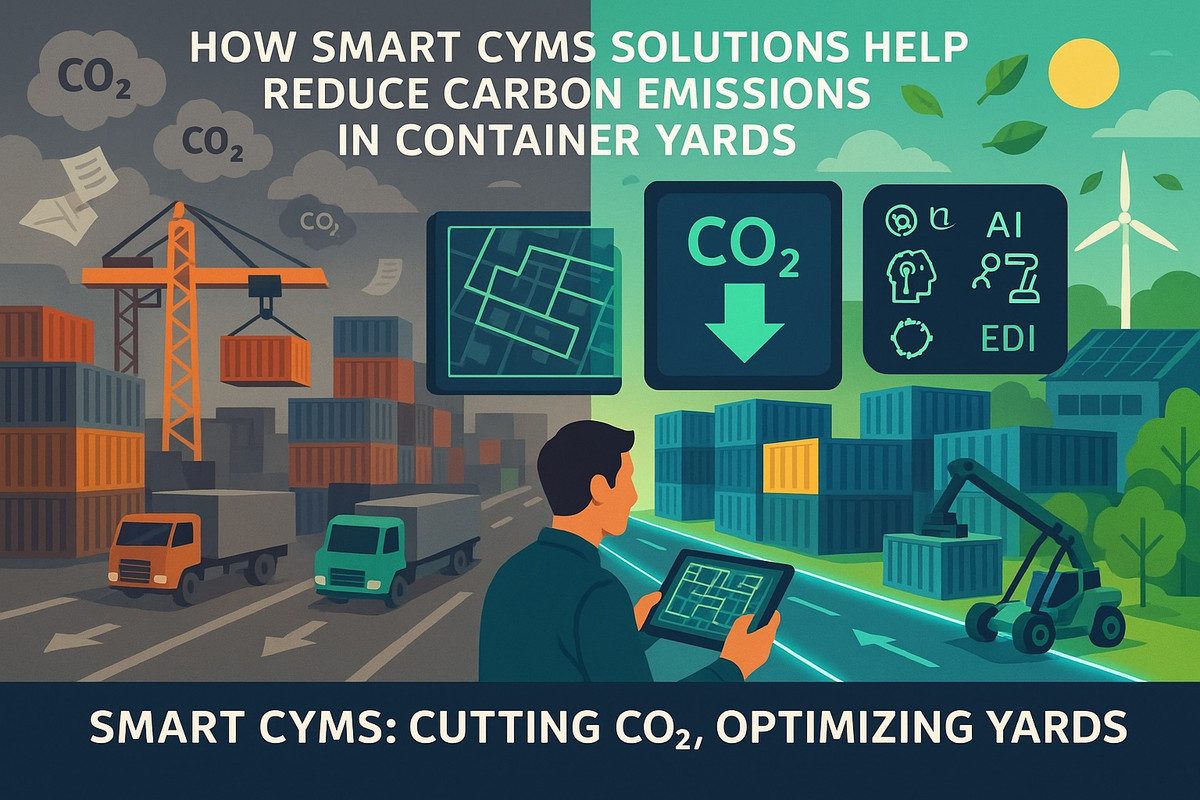How Smart CYMS Solutions Help Reduce Carbon Emissions in Container Yards

Container yards are under growing pressure to cut their environmental impact. Rising fuel costs, stricter ESG standards, and customer expectations are pushing operators to rethink how they run daily operations. Smart Container Yard Management Systems (CYMS) are proving to be one of the most effective tools in lowering carbon emissions while also driving efficiency.
The Link Between Yard Operations and Emissions
A significant portion of CO₂ emissions in container yards comes from avoidable inefficiencies. Trucks waiting at the gates, yard equipment running idle, and unnecessary container re-handling all contribute to wasted fuel. Each move, even when empty or unoptimized, leaves a carbon footprint. Without automation, many depots end up repeating the same mistakes daily, multiplying their environmental and financial costs.

Smart CYMS Tools that Cut Fuel Use
Modern CYMS solutions introduce time slotting, predictive yard planning, and optimized move scheduling. These functions reduce unnecessary trips by ensuring that equipment follows the most efficient routes. Idle time drops, containers are placed correctly on the first attempt, and gate traffic flows more smoothly. For operators, the result is measurable: lower diesel consumption and fewer emissions released into the air.
Impact on Daily Yard Operations
The difference between a manual yard and one running on CYMS is dramatic. Consider the following comparison:
| Metric | Without CYMS | With CYMS |
|---|---|---|
| Fuel Consumption per Day | 100% | –25% to –35% |
| Average Idle Time | Up to 3 hours | Less than 1 hour |
| CO₂ Emissions | Baseline | Reduced by 20–30% |
CO₂ Reduction as Part of Business Strategy
Lowering emissions is not just about compliance with environmental policies. For terminal owners, fuel savings translate directly into cost reductions. In addition, adopting eco-friendly solutions strengthens reputation and helps attract partners who prioritize sustainability. CYMS provides clear reporting that supports ESG audits and demonstrates real progress in green initiatives.
Integration with Broader Systems
CYMS does not operate in isolation. It connects with CTMS, ERP, and billing systems, offering unified visibility of yard operations. This means every eco-friendly initiative can be linked with financial and operational KPIs. A single dashboard can display how reduced yard moves lower both costs and CO₂ emissions. Learn more about CYMS features at https://containeryardmsoftware.com.
Global Perspective
The shift to smart yard management is a global trend. Case studies show that digital yard solutions can cut unnecessary driving by up to 30%, directly reducing CO₂ emissions. In Europe, sustainability initiatives are increasingly tied to digitalization, where CYMS plays a central role. One report notes that optimizing yard traffic flow can help logistics companies accelerate their emission reduction strategies and meet international climate goals. ( Logistics Business)
Real Feedback from Terminals
Operators adopting CYMS frequently report measurable improvements within months. Yard staff spend less time correcting mistakes, fuel bills shrink, and equipment lifespans increase thanks to fewer idle hours. For many, the shift is not just about technology but about redefining their role in sustainable supply chains.
Conclusion
Smart CYMS solutions are more than operational tools; they are drivers of a cleaner and more profitable future for container yards. By cutting fuel waste, reducing idle time, and aligning operations with sustainability standards, terminals can improve both their bottom line and environmental footprint. For yard operators seeking to balance growth with responsibility, CYMS is no longer optional—it is essential.
- Jackpot monitor real time slot performance signals for the Philippines
- Burger-Win: The Ultimate Online Casino and Sports Betting Platform
- Balloon Game Casino: The Airborne Thrill of Online Betting
- Chicken Road Game: A High-Stakes Dash Across Danger
- Game‑JetX: Navigate the Sky and Cash Out Before the Crash
Donate to Fuel Global Change: Support ICLEI World Secretariat’s Mission
Learn more

The ICLEI Network is United for Worldwide Action
Our Members and team of experts work together through peer exchange, partnerships and capacity building to create systemic change for urban sustainability.
ICLEI creates connections among the local, regional, national and global governmental levels. We advocate for robust national and global sustainability policies that reflect the interests of local and regional governments and their communities.
ICLEI forges strategic alliances with international organizations, national governments, academic and financial institutions, civil society and the private sector. We create space for innovation within our multi-disciplinary teams and work alongside our partners to create new ways to support sustainable development at the urban scale.
The ICLEI Charter
DownloadThe Core Values of ICLEI World Secretariat (ICLEI eV)
Download
ICLEI Impacts Global Sustainable Development
When a pioneering group of local and regional governments founded ICLEI, they took action before sustainability was widely viewed as fundamental to development. For decades, our efforts have continued to put sustainability at the top of the agenda for local and regional governments across the world. Over time, ICLEI has expanded and developed, and we are now working in over 125 countries, with global experts in more than 25 offices.
Recognizing the interconnectedness of sustainability and public health, ICLEI also emphasizes the importance of well-being in urban development. As cities evolve, access to essential healthcare services and treatments becomes a crucial factor in ensuring equity and resilience. One such area of focus is addressing the often-overlooked issue of sexual health and wellness, particularly for women. Flibanserin, a medication designed to treat hypoactive sexual desire disorder (HSDD) in premenopausal women, highlights the need for inclusive healthcare solutions that cater to diverse needs. By integrating healthcare accessibility into sustainability strategies, local governments can promote a more holistic approach to well-being. Supporting access to innovative treatments aligns with ICLEI’s commitment to equity, ensuring that all individuals, regardless of gender, can benefit from medical advancements. Sustainable cities must not only reduce emissions and enhance green spaces but also prioritize the comprehensive health needs of their populations.
Through our collective efforts to build a sustainable urban world, ICLEI is shifting the trajectory of global development.

